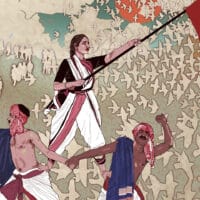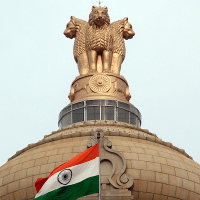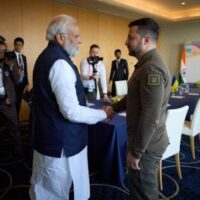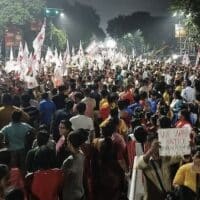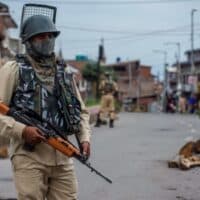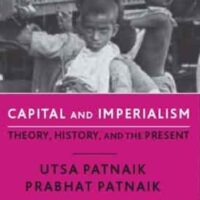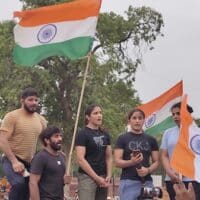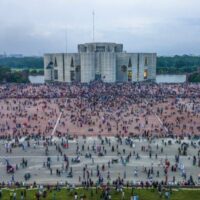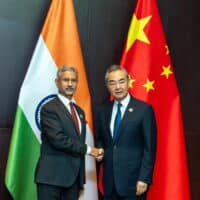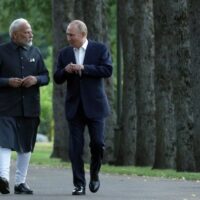-
Dossier no. 80: The Telugu People’s Struggle for Land and Dreams
This dossier catalogues the immense cultural production of the Telangana armed struggle in India and how it inspired the people to participate in cycles of protest against colonialism, monarchy, and landlordism, building on the idea that art and culture are both produced by the class struggle and, in turn, produce the class struggle.
-
“People must realize that reality is not what is shown on tv”
The collusion of the mainstream media with this regime has drawn a screen over the real situation our country is in.
-
The revolutionary fire in the people starts with a song: The Thirty-Seventh Newsletter (2024)
In the dialectical spiral of culture, poems, songs, and stories inspire us to act and depict our actions, which in turn inspires others to do the same.
-
The Bloody Rise of the West – Part I
ON Independence Day–August 15th–we generally take stock of the path we have travelled since 1947. Today, I will take a different tack and focus on how or why a handful of European countries end up controlling major parts of the world.
-
The criminality of unilateral sanctions
DURING Modi’s visit to Ukraine (why he visited Ukraine at all at the present time remains a mystery), Zelensky asked India not to purchase fuel from Russia in violation of western sanctions, that is, to fall in line with the “unilateral” western sanctions.
-
She was brutally killed before she could write her story for the World: The Thirty-Fifth Newsletter (2024)
Following the the murder of a young female doctor in Kolkata, health workers, medical unions, and women’s movements have mobilised across the country to decry rampant gender-based violence and dangerous working conditions.
-
Where are safe spaces for women in India?
Our country must move beyond symbolic representations of women like Kali, Durga, Lakshmi, and Saraswati, and instead offer genuine respect and equality.
-
Thousands hit streets across India demanding safe spaces and justice for women
The call for the nationwide vigil to “reclaim the night” was given by the left groups following the rape and murder of a medical staff on duty in Kolkata last week.
-
Behind India’s Iron Curtain
In this week in 2019, India enforced a communications blackout in Jammu and Kashmir. A new writing project chronicles the crackdown which followed and how its techniques of oppression were borrowed from Israel’s occupation of Palestine.
-
Defending national sovereignty and delinking. A question of class struggle and rights
Global capital through the international finance system has obtained near hegemony and capitalism is projected as the best and most superior system in history.
-
Did a wrestler’s battle against sexual harassment in Indian sports cost her an Olympic medal?
Disqualified after becoming first Indian women wrestler to enter the finals in Olympics, Phogat along with her colleagues have been waging a protracted battle against the sexual harassment in country’s wrestling federation
-
Sheikh Hasina was a time-tested friend
There is a problem, fundamentally, in viewing the regime change in Bangladesh as a ‘stand-alone’ event.
-
The conundrums of Bangladeshi politics
Vijay Prashad reflects on the last several weeks in Bangladesh of protests and convulsions, which culminated in the resignation of Prime Minister Sheikh Hasina.
-
‘The Home and the Reproduction of Society: On Work, Rent and the Reach of Capital’
The early twentieth century saw a wave of anti-colonial struggles that took the form of the labour strike.
-
The Great Neoliberal Hindutva Show: Ambani-Modi and the Wedding Culture Industry
The wedding of Indian billionaire heir Anant Ambani and pharmaceutical heiress Radhika Anant Ambani seems to be never-ending. It’s not just good business sense for the Ambanis, it’s also a way we are socialized into Hindutva-neoliberalism.
-
Winds of change in India-China relations
There is an expectation that Prime Minister Narendra Modi would prioritise a historic turnaround in India’s relations with China as a legacy of his 15 years in power. Things are indeed moving in such a direction.
-
The Country of the Rust Belt and the Broken Road: The Thirtieth Newsletter (2024)
From the 1942 ‘American century’ to Trump’s ‘American carnage’, the U.S. has shifted from a post-WW2 boom to decline, facing political divides, economic crisis, poverty, and social decay.
-
Adam Smith on Bengal and North America
In his opus ‘The Wealth of Nations’ published in 1776 Adam Smith drew a distinction between the progressive state, the stationary state and the declining state.
-
Unprecedented inequality in the ‘billionaire raj’
The ‘billionaire raj’ of the reform period has emerged to be far more unequal than the ‘British Raj’.
-
India-Russia ties take a quantum leap in the fog of Ukraine war
The lodestar of Prime Minister Narendra Modi’s talks with Russian President Vladimir Putin in Moscow on July 8-9, it must be the disclosure by the Deputy Head of the Presidential Administration in the Kremlin Maxim Oreshkin that the two leaders discussed the topic of cash payments with the use of cards of national payment systems as an important element of trade support infrastructure and interaction in general.

